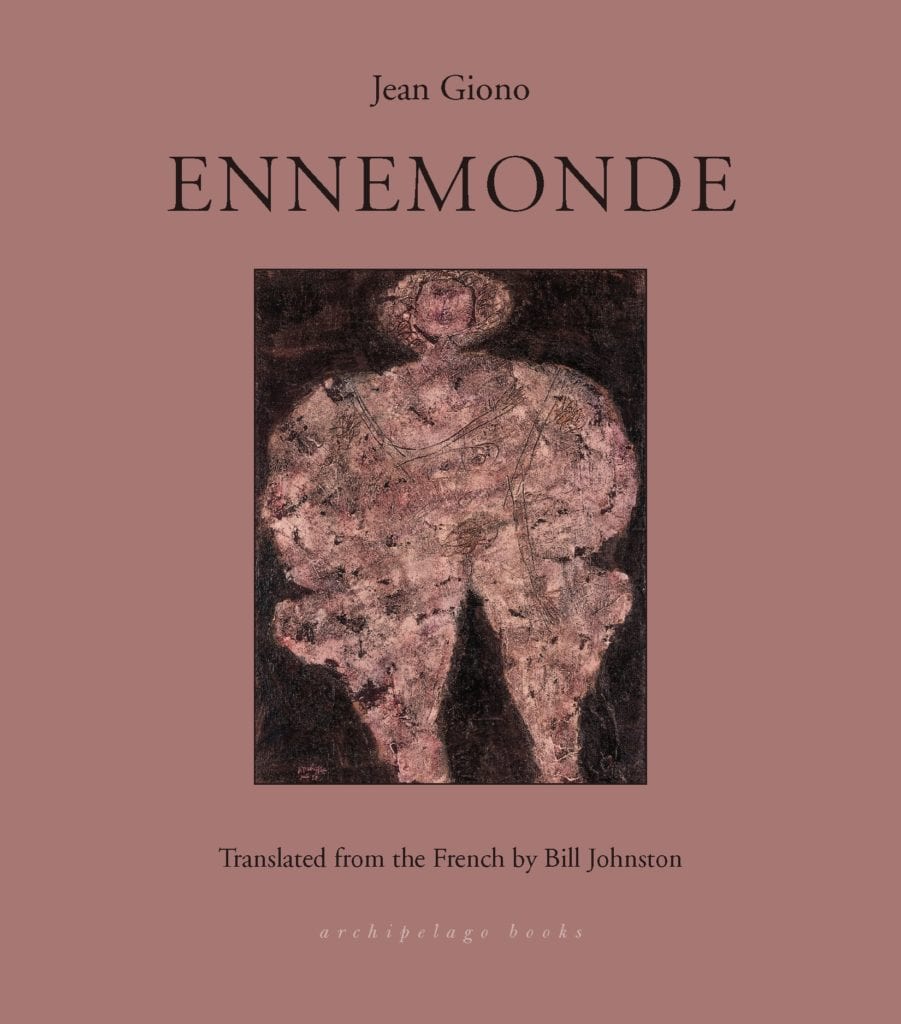Book Description
Ennemonde Girard: Obese. Toothless. Brilliant. Loving mother and murderous wife: a character like none other in literature. In telling us Ennemonde’s astounding story of undetected crimes, Jean Giono immerses us in the perverse and often lurid lifeways of the people of the High Country, where vengeance is an art form, hearts are superfluous, and only boldness and cunning such as Ennemonde’s can win the day. A gleeful sardonic grin of a novel.
Giono offers a steady flow of rich imagery and biographical tidbits about the denizens of a mountainous region of southwestern France in this sensual pastoral... The characters often feel like a manifestation of the rugged land they inhabit: the farm girl Ennemonde, for instance, born near the turn of the 20th century, possesses “a fruitlike beauty.”... Giono achieves an engaging and worldly narration, which grounds the reader in this juicy web of anecdotes.— Publishers Weekly
Ennemonde is a novel of nature, a novel that might tells us something about the gap between humanity and its environs . . . The sky is black, the trees – beeches, chestnuts, sessile oaks – are infinite, the rocks reverberate, and the peasants are murderous . . . We are in the realm of a naturalized Nietzsche here: what is valuable is what sustains and enhances life . . . Giono troubles us, asks us to pay attention, and finally . . . Giono shows us what one can see if one looks.— Duncan Stuart, Exit Only
In his novels, Giono's sensuous eye for detail, his fine insight into human behavior and the scope and resonance of his language transform every landscape, every encounter between his characters into an intimate, almost physical experience. The narrative has the compression of a short story... and leaves one feeling marked by an unusual sensibility, at once violent and tender.— Lydia Davis, The New York Times
Giono’s writing possesses a vigor, a surprising texture, a contagious joy, a sureness of touch and design, an arresting originality, and that sort of unfeigned strangeness that always goes along with sincerity when it escapes from the ruts of convention.— André Gide, unpublished letter
For Giono, literature and reality overlap the way that waves sweep over the shore, one ceaselessly refreshing the other and, in certain wondrous moments, giving it a glassy clearness.— Ryu Spaeth, The New Republic
Giono’s voice is the voice of the realist; his accents are the accents of simplicity, power and a passionate feeling for a land and a people that he must love as well as understand.— The New York Times
Giono’s prose is a singularly fine blend of realism and poetic sensibility. Essentially a poet, he has an acute faculty of penetration, a lucidity of spiritual vision, and a tender sympathy.— The Washington Post
This sharp little book marks a return to [Giono's] naturalistic themes, but with a bitter bite . . . Ennemonde hurtles onward, clause piled on descriptive clause, as if in every great arabesque of a sentence Giono were trying to encompass the whole of Provence. But he isn’t aiming for grace; no, it’s all spiteful glee in these lines . . . a riotous book.— Robert Rubsam, The Baffler
I'm reading Bill Johnston's translation of Jean Giono's Ennemonde, and have come to love the way Giono nestles a kernel of a story inside descriptions of the natural world and its inhabitants, human and otherwise. These plots are organic; they grow out of the soil.— Stephen Sparks, Point Reyes Books
Giono creates an atmosphere that is both contemporaneous and timeless... the epic instinct is active.— Ray C.B. Brown
The land, rough and wet and unparsable, is what dominates [Giono's] novels, dictating the movement of the plot and the development of the characters. Sitting somewhere between the psychologism of Proust or Gide and the realism of Zola, Giono’s dramas unfold as if the inanimate world were itself the primordial life-breath of the animate one . . . a superb English translation by Bill Johnston . . . Ennemonde is a novel about peasantry and the old Gionian world, but it is also one about art and writing themselves—about the acts of observing, of developing a scale.— Ben Libman, The Review of Uncontemporary Fiction
Ennemonde is the story’s titular heroine, a toothless obese woman, honest but otherwise amoral. She struggles for and wins unstinting respect from the folks in her area, buying, selling, and raising sheep . . . Giono seems to build a case for Ennemonde being a natural conclusion from the environment of the High Country, not a one-off. Thus, Ennemonde’s decisions to disrupt legal, ethical, and cultural traditions make sense in a world that never even pretended to uphold notions of Christian morality.— Tom Bowden, Bookbeat
Defying the stereotype of a strictly Provençal, folkloric, local writer, Giono reveals his entire cultural universe with great abandon and relish... Giono’s nature, animal world, and human society are incredibly rich and diversified.— Alice-Catherine Carls, World Literature Today
Even when it feels like the narrator is insulting, criticizing, belittling his rural characters, he is actually breaking them loose from the virtuous and the picturesque. Characters pull the sleight of hand of disappearing into their own environment, knowing nature for something other than scenery, impulse for something other than joyrides . . . The bitter tone of the book, mixed with the transcendently lovely descriptions that are so typical of Giono, has me wanting more than ever to situate the author in his past, present, future . . . [Ennemonde] feels like the culmination of several lifelong struggles.— Abby Walthausen, Asymptote
A tour de force in [its] own fashion . . . Giono (or Gallimard) calls [Ennemonde] a novel but it feels more like a collection of legends, a discursive anthology of the stories told in and about the real and imaginary place called the High Country, and another, distinctly low place called the Camargue.— Michael Wood, The London Review of Books

